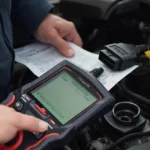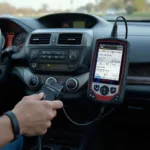The OBD2 code P0440 indicates a problem with your vehicle’s Evaporative Emission Control (EVAP) system. This system is designed to prevent fuel vapors from escaping into the atmosphere. Seeing this code means there’s a leak somewhere, but pinpointing it can be tricky. This comprehensive guide will delve into the P0440 code, helping you understand its causes, symptoms, diagnostic procedures, and potential solutions.
What Does the P0440 Code Mean?
The P0440 code specifically signifies a “general leak” in the EVAP system. This doesn’t point to a specific component, making diagnosis more challenging. The EVAP system is a sealed system comprising several components, including the fuel tank, gas cap, purge valve, vent valve, and charcoal canister. Any leak, big or small, within this system can trigger the P0440 code.
Common Causes of OBD2 Code P0440
Several issues can cause the P0440 code. Some of the most common culprits include:
- A loose or damaged gas cap: This is often the easiest fix.
- A cracked or damaged EVAP canister: This canister stores fuel vapors and requires replacement if damaged.
- Faulty purge or vent valves: These valves control the flow of vapors within the system. A malfunctioning valve can lead to leaks.
- Damaged EVAP lines or hoses: Cracks or holes in these lines can cause leaks.
Symptoms of a P0440 Code
While the check engine light is the most obvious sign, you might also experience:
- The smell of gasoline: A strong fuel odor, especially around the vehicle, can indicate a leak.
- Reduced fuel economy: A leak in the EVAP system can affect fuel efficiency.
- Difficulty starting the vehicle (in some cases): While less common, a severe EVAP leak can sometimes cause starting problems.
How to Diagnose OBD2 Code P0440
Diagnosing a P0440 requires a systematic approach:
- Check the gas cap: Ensure it’s tightly sealed. If it’s loose or damaged, replace it.
- Visually inspect the EVAP system: Look for any obvious cracks, damage, or disconnected hoses.
- Use an OBD2 scanner: Retrieve any other codes stored alongside the P0440. These can provide additional clues.
- Perform a smoke test: This test introduces smoke into the EVAP system, making leaks easier to spot.
“A smoke test is crucial for pinpointing EVAP leaks, especially small ones that are hard to see visually,” says automotive expert, Michael Stevens, ASE Certified Master Technician.
Fixing the P0440 Code
Once you’ve identified the leak’s source, the repair will depend on the specific component:
- Gas cap: Replace if damaged.
- EVAP lines/hoses: Replace the damaged section.
- Purge or vent valve: Replace the faulty valve.
- EVAP canister: Replace the canister.
Conclusion
The OBD2 code P0440 indicates a general leak in your vehicle’s EVAP system. While diagnosing the specific cause can be challenging, this guide provides the steps necessary to identify and fix the issue. Addressing the P0440 code is important not only for passing emissions tests but also for maintaining your vehicle’s performance and preventing harmful fuel vapors from polluting the environment.
FAQs
-
Can I drive with a P0440 code? Yes, you can usually drive with a P0440 code, but it’s best to get it fixed as soon as possible.
-
How much does it cost to fix a P0440 code? The cost varies depending on the faulty component. A gas cap replacement is inexpensive, while an EVAP canister replacement can be more costly.
-
Can a bad gas cap cause a P0440 code? Yes, a loose, damaged, or improperly sealed gas cap is a frequent cause of the P0440 code.
-
Will a P0440 code cause my car to fail emissions? Yes, in most states, a P0440 code will result in a failed emissions test.
-
How often should I check my EVAP system? It’s a good idea to have your EVAP system checked during regular vehicle maintenance.
“Regular maintenance and inspections are key to preventing EVAP system problems and avoiding costly repairs down the road,” adds Stevens.
You might also find our articles on 2003 chevy trail blazer obd2 codes po440 and what are most common problems obd2 2003 trailblazer helpful.
Need help? Contact us via WhatsApp: +1(641)206-8880, Email: [email protected] or visit us at 789 Elm Street, San Francisco, CA 94102, USA. We have a 24/7 customer support team.


